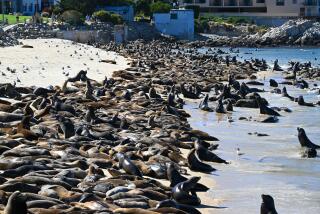Foxes Are Moving to the Wild
- Share via
National Park Service biologists have begun releasing endangered foxes on two of the eight Channel Islands, part of a captive breeding program begun six years ago to protect the species.
The releases of 40 adult foxes and pups began this month and will continue through November. The plan calls for 23 on San Miguel Island and 17 on Santa Rosa Island, which are 55 miles and 40 miles west of Ventura, respectively.
This year, more than 100 pups have been born in the wild and through captive breeding. Federal scientists recommend releasing up to half of the captives because of continued threats from predators. There are 48 foxes in the protected breeding program on San Miguel and 18 in the wild. Santa Rosa has 51 foxes in captivity and 21 in the wild.
“There were some surprises. Of the foxes released for the first time on San Miguel last fall, four females produced a total of nine pups this spring,” said Yvonne Menard, a park service spokeswoman.
The cat-sized foxes are a distinct subspecies of island fox and are found on the majority of Southern California’s offshore islands, including three of the five islands constituting Channel Islands National Park.
Their population declined by 95% to about 120 between 1994 and 2000, according to the park service. The U.S. Fish and Wildlife Service listed the foxes as endangered in March 2004. Park service scientists blamed the fox deaths on the golden eagle, which is not native to the islands.
The park service has worked since 1999 to rebuild the fox population through captive breeding and by relocating 41 golden eagles, which are the foxes’ prime predators, to the mainland; returning bald eagles, which feed mainly on fish; and killing the thousands of wild pigs that live on Santa Cruz Island and attract golden eagles.
A national animal rights group and a Santa Barbara County businessman sued the park service to halt the $7-million feral pig hunt on Santa Cruz Island, in which more than 2,500 of the animals have died so far. Their request for a preliminary injunction to halt the killings was declined Sept. 26, and the parties intend to appeal.
More to Read
Sign up for Essential California
The most important California stories and recommendations in your inbox every morning.
You may occasionally receive promotional content from the Los Angeles Times.













